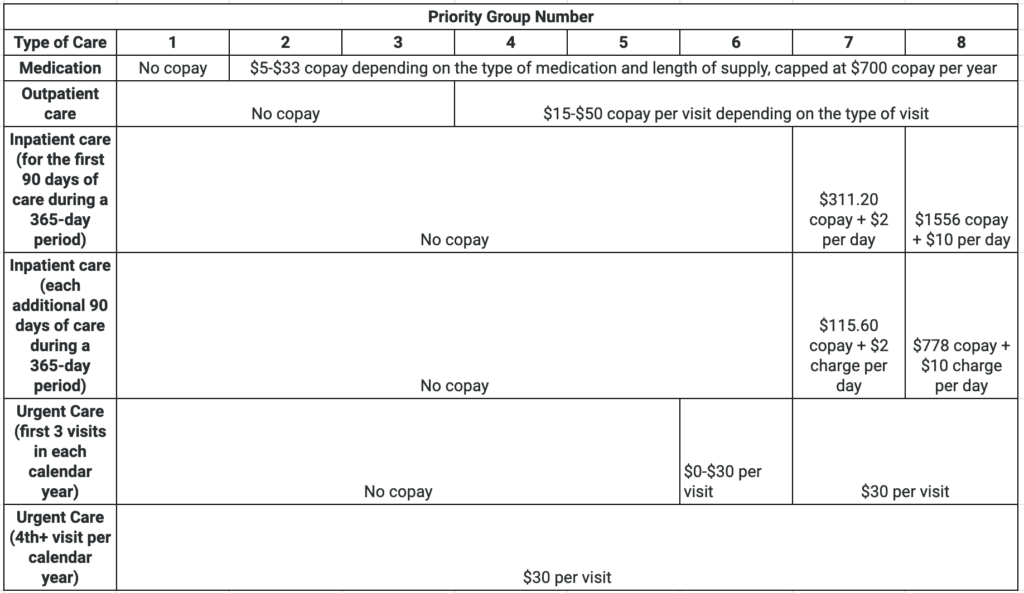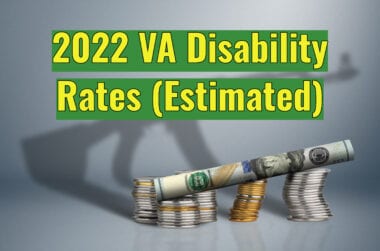A VA medical records overhaul is happening to modernize the way the VA and Department of Defense share patient records between health systems. As a result, the VA created My VA Health, an online patient portal, to make it easier to access VA medical records as service members transfer from military service to veteran status.
The Veterans Health Administration (VHA) has 1,293 health care facilities which includes 171 VA Medical Centers and 1,112 VHA outpatient clinics. These medical centers and clinics provide care for over 9 million veterans enrolled in VA health care. This article explains the critical transition the VA is making to My VA Health and the resulting changes to how you access VA health care and medical records.
Read on to learn some essentials of seeking out VA health care and accessing your military and VA medical records—both the traditional way and with the new My VA Health.
- 1. What is My VA Health?
- 2. What is the VHA?
- 3. Is VA health care free for all veterans?
- 4. Are there income limits to qualify for VA Health care?
- 5. What is the VA 10-year rule?
- 6. Is my wife covered by my VA health care benefits?
- 7. How long does the VA keep medical records to track my VA health?
- 8. Where do I find my military health records?
- 9. What is MyHealtheVet?
- About the Author
You DESERVE a HIGHER VA rating.
WE CAN HELP.
Take advantage of a FREE VA Claim Discovery Call with an experienced Team Member. Learn what you’ve been missing so you can FINALLY get the disability rating and compensation you’ve earned for your service.
1. What is My VA Health?
My VA Health is VA’s new electronic health record (EHR) and patient portal. As a complementary tool to VA’s existing My HealtheVet patient portal, My VA Health will allow veterans to manage their appointments, prescription refills, medical records and communication with health care providers online.

The implementation is intended to improve how clinicians store and manage patient information. It will also mean changes to how veterans access their own health data online, if and when their VA facilities change to the new portal.
Currently, only the Spokane VA Medical Center is offering veterans access to the new patient portal. The VA Central Ohio Healthcare System is the next area scheduled to transition to the electronic health record system with My VA Health during the spring of 2022.
Veterans who receive care at Mann-Grandstaff VA Medical Center (VAMC) in Spokane, Washington, and its community-based outpatient clinics in Coeur d’Alene and Sandpoint, Idaho; Libby, Montana; and Wenatchee, Washington, will be the first in the nation to use My VA Health.
Since full implementation of My VA Health is expected to occur over a 10-year period ending in 2028, most veterans will not see immediate changes to how they view their medical records online.
2. What is the VHA?
The Veterans Health Administration (VHA) is just one of three divisions making up the U.S. Department of Veterans Affairs (DVA). These divisions include:
- Veterans Health Administration (VHA)
- Veterans Benefits Administration (VBA), and
- National Cemetery Administration.
This article focuses on the VHA; however, it’s essential to understand the difference between VHA and Veterans Benefits Administration (VBA).
The mission of the VHA is to honor veterans and their families by administering health benefits and delivering world-class administration to veterans. The VHA provides health care to veterans, while the VBA offers financial assistance and additional services (disability compensation and much more).
When you file a VA disability claim, these two organizations come together as the VBA works with the VHA to schedule and complete your compensation and pension (C&P) exam, which is typically a critical step in winning your VA claim.
If you’re looking for a Veterans Health Administration (VHA) location near you, you can use the locator to find care sorted by facility type and service type.
3. Is VA health care free for all veterans?
While VA health care benefits aren’t free for all veterans, the VA does provide free and low-cost health care for any condition related to military service.
Treatment for non-service connected disabilities may incur co-pays depending on the specific situation. There may also be small co-pays if you’re rated under 50%. Learn more about copays.

To be eligible for VA health care benefits, you must have served 24 continuous months or the entire period you were called to active duty (if you enlisted after September 7, 1980, or entered active duty after October 16, 1981).
There are several exceptions to this rule, so the VA encourages all veterans to apply to determine enrollment eligibility.
To qualify for free VA health care, you must meet one of the following requirements:
- You’re a veteran with a catastrophic disability, or
- You’re a veteran with a VA disability rating of at least 50 percent, or
- You’re a veteran who can’t afford to pay for care.
Certain VA health care services are free for all veterans, regardless of income, VA disability rating, or VA health care enrollment status. These include:
- Care related to a VA-rated service-connected disability
- VA claim exams
- Mental health services
- Readjustment counseling
- Counseling for military sexual trauma
- Care related to combat service after November 11, 1998
- Exams to determine risks of health problems as a result of specific military service
- Care for head and neck cancers caused by radium treatments during military service
- Weight loss and smoking cessation programs
- Lab tests
- Electrocardiograms (EKGs) to check for heart disease or other heart issues
You aren’t eligible for VA healthcare if:
- You don’t have a service-connected condition, and
- You enrolled in VA health care after January 16, 2003, and
- Your income exceeds the current VA or geographical limits by 10% or more (currently, this is $38,078 for a veteran with no dependents).
Even if you don’t qualify for free VA health care, you may still be eligible for VA health care with copayments. More on this below.
4. Are there income limits to qualify for VA Health care?
If you’re looking to enroll in VA health care, you’ll first be sorted into a VA health care priority group. Several of these priority groups take income into consideration.
Veterans with gross household annual income below these thresholds may be eligible for cost-free care:
| Number of Dependents | VA National Income Threshold |
| 0 | $34,616 or less |
| 1 | $41,539 or less |
| 2 | $43,921 or less |
| 3 | $46,303 or less |
| 4 | $48,685 or less |
Income Thresholds for Cost-Free Health Care, Medications and/or Beneficiary Travel Eligibility
The VA may assign you to priority groups based on these criteria:
- Priority Group 1
- You have a VA disability rating of 50 percent or more,
- You have a service-connected disability with an unemployable rating, or
- You’ve received the Medal of Honor.
- Priority Group 2
- You have a VA disability rating of 30 to 40 percent.
- Priority Group 3
- You have a VA disability rating of 10 to 20 percent, or
- You’re a former POW, Purple Heart recipient, or
- You were discharged due to a disability caused by active-duty service, or
- You’ve been awarded special eligibility for benefits for individuals disabled by treatment or vocational rehabilitation.
- Priority Group 4
- You’re receiving VA Aid and Attendance or household benefits, or
- The VA has determined you’re catastrophically disabled.
- Priority Group 5
- You’re receiving VA pension benefits,
- You’re eligible for Medicaid, or
- You meet both of these criteria:
- You don’t have a service-connected disability, or you have a 0 percent VA rating for a non-compensable disability, AND
- You have an annual income below income limits based on your zip code.
- Priority Group 6
- You have a 0 percent VA rating for a compensable disability,
- You were exposed to radiation,
- You participated in Project 112/SHAD, or
- You served in one of the following locations:
- The Republic of Vietnam between January 9, 1962, and May 7, 1975, or
- The Persian Gulf War between August 2, 1990, and November 11, 1998, or
- At Camp Lejeune for at least 30 days while on active duty between August 1, 1953, and December 31, 1987.
Priority Groups 7 and 8 are different in that you must agree to pay copays before being assigned to either group and before being approved for VA health care.
- Priority Group 7
- Your gross household income is below the geographically adjusted income limits (GMT) for where you live.
- Priority Group 8
- Your gross household income is above VA income limits and GMT for where you live.
If you receive disability compensation from the VA, you’re more likely to be placed in a priority group, making you eligible for VA health care. (Keep in mind this isn’t the only consideration, but for many veterans, a VA disability rating grants access to VA health care at least for that condition—which is why filing a VA disability claim is so important to get you the health care you earned!)
Cost of Care by Priority Group Number for 2022

Can you lose VA medical benefits?

The main reason for losing VA medical benefits is if the VA takes away service connection for your disability. Two situations could cause service connection to be severed: fraud (committed by you) or error by the VA.
If the VA determines you committed fraud to obtain a service-connected rating, you will lose your VA medical benefits—IF you don’t qualify for VA health care via another service-connected disability or under other eligibility requirements.
If the VA finds an error in the decision that granted service connection, they have 10 years to correct this error. After that, the 10-year rule applies.
5. What is the VA 10-year rule?
Under the 10-year rule, the VA can’t eliminate your rating for a specific condition if your rating has been in place for 10 years or more. However, your rating for that condition could be reduced if medical evidence shows that your condition has improved. Your disability compensation will also be reduced if your disability rating is reduced.
This rule doesn’t apply if the VA determines that the original disability was based on fraud.
6. Is my wife covered by my VA health care benefits?
Unfortunately, spouses aren’t covered under VA health care benefits. There are several options for spouses to receive care from the same VA facility, but these benefits are provided under a different program.
If you’re a retired service member, chances are your spouse and dependents are covered under TRICARE, a Department of Defense program. TRICARE covers family members for active-duty, retired, and deceased service members, National Guard members, Reservists, and Medal of Honor recipients.
Spouses may also be eligible for care through the Civilian Health and Medical Program of the Department of Veterans Affairs (CHAMPVA). CHAMPVA is a health insurance program that shares the cost of health care.
What are the requirements for my wife to receive health care benefits?
For your spouse or child to qualify for CHAMPVA they must not be eligible for TRICARE. Veterans and military members must also meet one of these requirements:
- The veteran has a Permanent and Total (P&T) disability rating,
- The veteran died from a service-connected disability,
- The veteran died with a P&T service-connected disability rating in place, or
- The military member died in the line of duty, not due to misconduct. (Spouses and children of these members are often already eligible for TRICARE.)
The timeframe from applying to receiving CHAMPVA coverage is typically six weeks. Learn more about CHAMPVA and how to apply for benefits through the VA.
Also see our post Benefits For Children of Veterans: Are My Kids Covered By The VA?
7. How long does the VA keep medical records to track my VA health?
VA medical records are theoretically kept forever, but more thorough record-keeping didn’t begin until the 1960s. Keeping a copy of your military medical records—or requesting a copy to save for your own records—is always a good idea.
8. Where do I find my military health records?
If you’re planning to file a VA disability claim, your military medical records can be beneficial for substantiating the presence and severity of the disability for which you’re claiming.
The VA is currently in the process of digitizing all military Service Treatment Records (STR). This process isn’t complete yet. Until the project is finished, where you can request copies of your military health records depends on two things; when you served and which branch of service you served in.
In general, if you served before 1992, your records will be stored with the National Personnel Records Center (NPRC).
Depending on your branch of service, if you served after 1992, your military medical records will probably be with the Department of Veterans Affairs.
If you can’t find your medical records with the VA or the NPRC, you should file a Freedom of Information Act (FOIA) request.

You can find more information on where to look in our article detailing where to find military medical records. We also walk you through this process in our video, How to Request Copies of Your Military Medical Records.
How do I find old VA health records?
VA health records are accessible at the VA medical center you are assigned to or via MyHealtheVet. They’re also accessible at the Mann-Grandstaff VA Medical Center or any of its clinics:
- Coeur d ‘Alene VA Clinic
- East Front Avenue VA Clinic
- Libby VA Clinic
- Sandpoint VA Clinic
- Spokane VA Clinic
- Wenatchee VA Clinic
by visiting this pilot program site: https://patientportal.myhealth.va.gov/
If you’re a veteran enrolled in health care at the Mann-Grandstaff VA Medical Center, you can access the patient portal by using the My VA Health login.
Can I obtain my medical records online?
You may obtain recent VA and DoD medical records online through MyHealtheVet, or through My VA Health if you’re enrolled in VA healthcare at the Mann-Grandstaff VA Medical Center, thanks to the VA medical records overhaul in 2022.
9. What is MyHealtheVet?
MyHealtheVet is an online portal for veterans to access most medical records and treatment through VA health care. Veterans can manage VA prescriptions, track appointments, communicate with your VA health care team, and view or download health records.
Anyone can register on MyHealtheVet starting with a Basic account, which gives you limited access to the site’s features. Upgrading to a Premium account verifies your identity and expands your access to the site—including VA and DoD records.
My VA Health is intended to complement MyHealtheVet and offers improvements in efficiency and functionality once the project is completed (projected 2028). Currently, however, it is in pilot mode only, as mentioned earlier.
While MyHealtheVet does provide some health records, not all veteran health records are available through this portal. Some information is excluded from your records through the Blue Button on My HealtheVet. If you’re enrolled in VA health care and registered as a patient in a VA health facility, you can find modern VA health records online via the VA’s Blue Button application.
NEED MORE ASSISTANCE?
Most veterans are underrated for their disabilities and therefore not getting the compensation they’re due. At VA Claims Insider, we help you understand and take control of the claims process, so you can get the rating and compensation you’re owed by law.
Our process takes the guesswork out of filing a VA disability claim and supports you every step of the way in building a fully-developed claim (FDC)—so you can increase your rating fast!
If you’ve filed your VA disability claim and have been denied or have received a low rating—or you’re unsure how to get started—reach out to us! Take advantage of a FREE VA Claim Discovery Call. Learn what you’ve been missing—so you can FINALLY get the disability rating and compensation you deserve!
We’ve supported more than 15,000 veterans to win their claims and increase their ratings. NOW IT’S YOUR TURN.
About the Author

About VA Claims Insider
VA Claims Insider is an education-based coaching/consulting company. We’re here for disabled veterans exploring eligibility for increased VA disability benefits and who wish to learn more about that process. We also connect veterans with independent medical professionals in our referral network for medical examinations, disability evaluations, and credible independent medical opinions and nexus statements (medical nexus letters) for a wide range of disability conditions.



